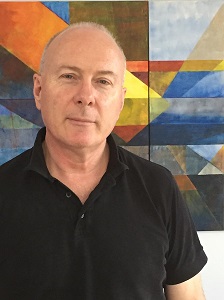De Australische dichter en academicus Paul Hetherington werd geboren op 6 maart 1958 in Rose Park, Adelaide. Hij groeide daar op met zijn tweelingbroer Mark en zijn jongere zus Naomi totdat zijn familie in 1966 naar Perth verhuisde toen zijn vader een baan accepteerde aan de sectie Politiek van de University of Western Australia Zijn vader werd later een West-Australisch parlementslid. Zijn moeder was historica gespecialiseerd in de Afrikaanse geschiedenis en de geschiedenis van de vrouw, die aan de universiteit van West-Australië werkte. Hetherington volgde zijn eigen undergraduate studies aan de Universiteit van West-Australië. Hij voltooide een proefschrift aan dezelfde universiteit in 1989 over het onderwerp ‘”The Representative of the Verse”: Death, Crisis and Versions of the Self in the Poetry of Emily Dickinson’. Toen hij in de twintig was schreef hij voor verschillende amateurtheatergroepen waarvoor hij ook als regisseur werkte. Hij trouwde in 1985 met Michelle Frances Combs en kreeg twee dochters. Hetherington werkte als tutor terwijl hij een postdoctorale studie volgde en aanvaardde vervolgens de baan van Publications and Events Coordinator bij Fremantle Arts Centre in 1989. In 1990 verhuisde hij naar de National Library als Education Manager en redacteur van National Library News (1990 tot 2009). In 1994 werd hij directeur van de Publications Branch van de Library en van 1999 tot 2009 voor de Publications and Events Branch, waar hij onder andere verantwoordelijk was voor het uitgeven van boeken, het ontwikkelen van websites en een conferentieprogramma. Na zijn vertrek uit de National Library of Australia werd hij in 2010 universitair docent Schrijven aan de faculteit Arts and Design aan de Universiteit van Canberra en is hij nu hoogleraar Schrijven daar. Hij is hoofd van het International Poetry Studies Institute (IPSI) at mede werd opgericht met Jen Webb en post-doc Paul Munden. Ook is hij mede-oprichter van het International Prose Poetry Project. Hetherington bekleedde daarnaast nog tal van andere functies. Hetherington’s carrière als schrijver omvat meer dan 30 jaar, en hij heeft 12 volwaardige dichtbundels en zes poëzie chapbooks gepubliceerd, samen met talrijke academische artikelen. Hij heeft op 11-jarige leeftijd al gezegd dat hij poëzie wilde schrijven. Zijn eerste bundel Acts “Themselves Trivial”verscheen in 1991.Voor “Shadow Swimmer” ontving hij in 1996 de ACT Book of the Year Award. Er volgden nog diverse prijzen en onderscheidingen.
Shadows
I was caught again in days I long ago
shuffled off, away, away, caught
in the dappled wind-stretched pool, the close
enfolding hum of insects. As I move
through the shadows of my years I am
a boy who is looking for a new sensation,
a purity of feeling, the wind’s light-fingered
touch, the gentle sway of lingering
in a stolen boat, and the voice of my friend
unfolding, my adulthood approaching
in the touch of fingers softer than the wind.
Writing
We’ve come into a place described by trees,
and a straggling beauty: callistemons,
acacias and eucalypts, in bloom,
in winter, in the warmth of autumn, come
where there’s a chance at slowly forgetting
the nagging of others and high abstractions —
a step into our tangled colloquialisms,
a hesistant discourse with our language —
of love, of daily dissatisfaction,
of joy, of perennial uncertainty,
of passion muted, domestic distractions,
of perceptions spoiled by the monotony of chores,
then fattening suddenly on a child’s love.
We’ve come into an edgy, simpler life
than the intellect can ever offer,
found in the making of a daily balance,
hard-worked and fragile, to stabilize
our simultaneous looking near and far,
and our searching emotions that range
over all we have and think on, to locate
our love of words, our stepping towards them.
By Her Children
By her playing children her soft pride
was mortified within her, as her beauty
slowly declined towards these ceaseless tasks:
folding, planting, washing, cooking, while
her three children defied and challenged her—
how had they been made? Could she shape them?
How did she maintain imagination?
She felt a yearning for something undefined.
Her past preoccupied, though she was free
from her father’s distant perplexity and presence,
her mother’s law. What could now repel
her sense of self from her constructed life?
She saw herself in heat-hazed fields and laughed,
washing the dishes. She looked out on the trees
which she had nurtured—so very many of them
and so much green. And inwardly she yearned.

